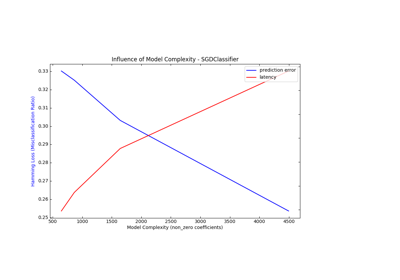sklearn.svm.NuSVR¶
-
class
sklearn.svm.NuSVR(nu=0.5, C=1.0, kernel='rbf', degree=3, gamma='auto_deprecated', coef0=0.0, shrinking=True, tol=0.001, cache_size=200, verbose=False, max_iter=-1)[source]¶ Nu Support Vector Regression.
Similar to NuSVC, for regression, uses a parameter nu to control the number of support vectors. However, unlike NuSVC, where nu replaces C, here nu replaces the parameter epsilon of epsilon-SVR.
The implementation is based on libsvm.
Read more in the User Guide.
Parameters: - nu : float, optional
An upper bound on the fraction of training errors and a lower bound of the fraction of support vectors. Should be in the interval (0, 1]. By default 0.5 will be taken.
- C : float, optional (default=1.0)
Penalty parameter C of the error term.
- kernel : string, optional (default=’rbf’)
Specifies the kernel type to be used in the algorithm. It must be one of ‘linear’, ‘poly’, ‘rbf’, ‘sigmoid’, ‘precomputed’ or a callable. If none is given, ‘rbf’ will be used. If a callable is given it is used to precompute the kernel matrix.
- degree : int, optional (default=3)
Degree of the polynomial kernel function (‘poly’). Ignored by all other kernels.
- gamma : float, optional (default=’auto’)
Kernel coefficient for ‘rbf’, ‘poly’ and ‘sigmoid’.
Current default is ‘auto’ which uses 1 / n_features, if
gamma='scale'is passed then it uses 1 / (n_features * X.std()) as value of gamma. The current default of gamma, ‘auto’, will change to ‘scale’ in version 0.22. ‘auto_deprecated’, a deprecated version of ‘auto’ is used as a default indicating that no explicit value of gamma was passed.- coef0 : float, optional (default=0.0)
Independent term in kernel function. It is only significant in ‘poly’ and ‘sigmoid’.
- shrinking : boolean, optional (default=True)
Whether to use the shrinking heuristic.
- tol : float, optional (default=1e-3)
Tolerance for stopping criterion.
- cache_size : float, optional
Specify the size of the kernel cache (in MB).
- verbose : bool, default: False
Enable verbose output. Note that this setting takes advantage of a per-process runtime setting in libsvm that, if enabled, may not work properly in a multithreaded context.
- max_iter : int, optional (default=-1)
Hard limit on iterations within solver, or -1 for no limit.
Attributes: - support_ : array-like, shape = [n_SV]
Indices of support vectors.
- support_vectors_ : array-like, shape = [nSV, n_features]
Support vectors.
- dual_coef_ : array, shape = [1, n_SV]
Coefficients of the support vector in the decision function.
- coef_ : array, shape = [1, n_features]
Weights assigned to the features (coefficients in the primal problem). This is only available in the case of a linear kernel.
coef_ is readonly property derived from dual_coef_ and support_vectors_.
- intercept_ : array, shape = [1]
Constants in decision function.
See also
Notes
References: LIBSVM: A Library for Support Vector Machines
Examples
>>> from sklearn.svm import NuSVR >>> import numpy as np >>> n_samples, n_features = 10, 5 >>> np.random.seed(0) >>> y = np.random.randn(n_samples) >>> X = np.random.randn(n_samples, n_features) >>> clf = NuSVR(gamma='scale', C=1.0, nu=0.1) >>> clf.fit(X, y) #doctest: +NORMALIZE_WHITESPACE NuSVR(C=1.0, cache_size=200, coef0=0.0, degree=3, gamma='scale', kernel='rbf', max_iter=-1, nu=0.1, shrinking=True, tol=0.001, verbose=False)
Methods
fit(X, y[, sample_weight])Fit the SVM model according to the given training data. get_params([deep])Get parameters for this estimator. predict(X)Perform regression on samples in X. score(X, y[, sample_weight])Returns the coefficient of determination R^2 of the prediction. set_params(**params)Set the parameters of this estimator. -
__init__(nu=0.5, C=1.0, kernel='rbf', degree=3, gamma='auto_deprecated', coef0=0.0, shrinking=True, tol=0.001, cache_size=200, verbose=False, max_iter=-1)[source]¶ Initialize self. See help(type(self)) for accurate signature.
-
fit(X, y, sample_weight=None)[source]¶ Fit the SVM model according to the given training data.
Parameters: - X : {array-like, sparse matrix}, shape (n_samples, n_features)
Training vectors, where n_samples is the number of samples and n_features is the number of features. For kernel=”precomputed”, the expected shape of X is (n_samples, n_samples).
- y : array-like, shape (n_samples,)
Target values (class labels in classification, real numbers in regression)
- sample_weight : array-like, shape (n_samples,)
Per-sample weights. Rescale C per sample. Higher weights force the classifier to put more emphasis on these points.
Returns: - self : object
Notes
If X and y are not C-ordered and contiguous arrays of np.float64 and X is not a scipy.sparse.csr_matrix, X and/or y may be copied.
If X is a dense array, then the other methods will not support sparse matrices as input.
-
get_params(deep=True)[source]¶ Get parameters for this estimator.
Parameters: - deep : boolean, optional
If True, will return the parameters for this estimator and contained subobjects that are estimators.
Returns: - params : mapping of string to any
Parameter names mapped to their values.
-
predict(X)[source]¶ Perform regression on samples in X.
For an one-class model, +1 (inlier) or -1 (outlier) is returned.
Parameters: - X : {array-like, sparse matrix}, shape (n_samples, n_features)
For kernel=”precomputed”, the expected shape of X is (n_samples_test, n_samples_train).
Returns: - y_pred : array, shape (n_samples,)
-
score(X, y, sample_weight=None)[source]¶ Returns the coefficient of determination R^2 of the prediction.
The coefficient R^2 is defined as (1 - u/v), where u is the residual sum of squares ((y_true - y_pred) ** 2).sum() and v is the total sum of squares ((y_true - y_true.mean()) ** 2).sum(). The best possible score is 1.0 and it can be negative (because the model can be arbitrarily worse). A constant model that always predicts the expected value of y, disregarding the input features, would get a R^2 score of 0.0.
Parameters: - X : array-like, shape = (n_samples, n_features)
Test samples. For some estimators this may be a precomputed kernel matrix instead, shape = (n_samples, n_samples_fitted], where n_samples_fitted is the number of samples used in the fitting for the estimator.
- y : array-like, shape = (n_samples) or (n_samples, n_outputs)
True values for X.
- sample_weight : array-like, shape = [n_samples], optional
Sample weights.
Returns: - score : float
R^2 of self.predict(X) wrt. y.
-
set_params(**params)[source]¶ Set the parameters of this estimator.
The method works on simple estimators as well as on nested objects (such as pipelines). The latter have parameters of the form
<component>__<parameter>so that it’s possible to update each component of a nested object.Returns: - self


